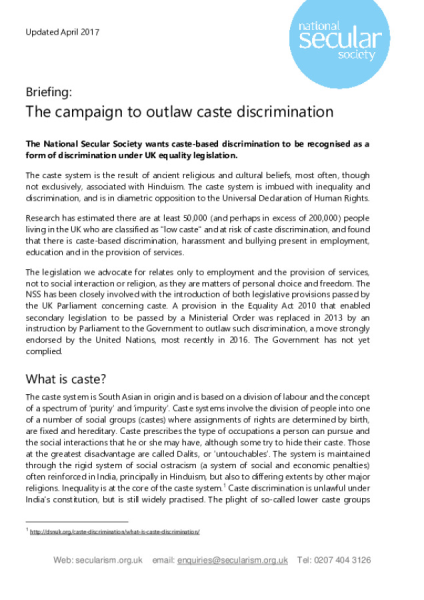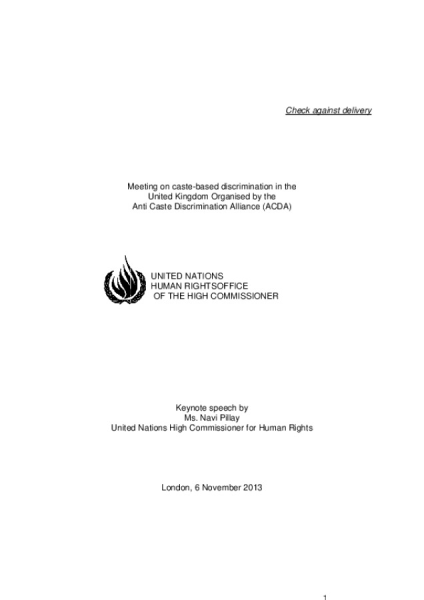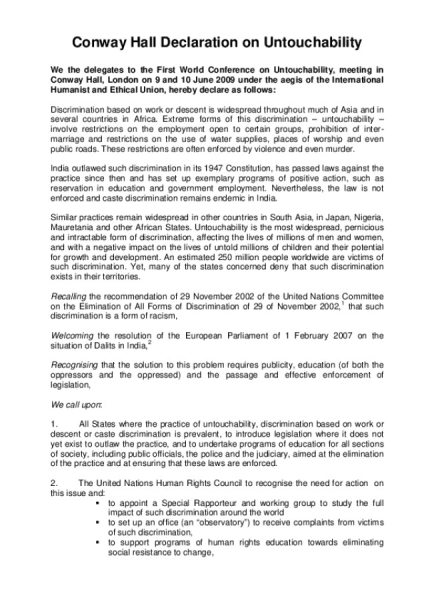
Outlaw 'caste' discrimination
Caste-based prejudice should have no place in modern Britain. We want to see caste-based discrimination explicitly recognised as a form of discrimination under UK equality legislation.
What's the problem?
The caste system is the result of ancient religious and cultural beliefs, most often, though not exclusively, associated with Hinduism. The caste system is imbued with inequality and discrimination, and is in diametric opposition to the Universal Declaration of Human Rights.
Research has estimated there are at least 50,000 (and perhaps in excess of 200,000) people living in the UK who are classified as "low caste" and at risk of caste discrimination, and found that there is caste-based discrimination, harassment and bullying present in employment, education and in the provision of services.
The Equality Act does not explicitly deal with the issue of caste, meaning victims of caste discrimination currently have to use unclear and precarious case law to secure justice. An express provision in the Equality Act 2010 would remove any legal uncertainty. Both Parliament and the United Nation Human Rights Council have called on the Government to explicitly outlaw caste-based discrimination, but it has delayed doing so for years.
In April 2017 the Government announced a long awaited public consultation on the issue of caste and the Equality Act 2010. This provides an opportunity to again press the Government to do the right thing and explicitly outlaw caste-based discrimination.
Find out more
Related news
Departing MP blasts Government on caste discrimination
Posted: Fri, 5 May 2017 10:00
Former MP Graham Allen has accused the Government of launching a "misleading" consultation to delay action against caste discrimination "for ever".
In an open letter to Justine Greening, the Minister for Equalities, Allen wrote that public consultations "have a deservedly poor reputation" but that he could not recall one "that is so misleading and biased".
He said the Government's "clear intention is to delay – probably forever – legislative protection against caste discrimination".
Allen wrote that action would be "so easy" to achieve if ministers used their powers to enact secondary legislation explicitly outlawing discrimination on the basis of caste.
The UN has repeatedly called for legislation outlawing caste.
Allen rejected the Government's argument against legislation, and said that simply waiting and hoping for appropriate case law to develop was totally insufficient.
He said he feared that the Government will use the "dysfunctional consultation" to justify continuing not to legislate, as it has avoided doing since coming into office. He warned that if this happens, the courts will take this as a signal that they should not develop case law to outlaw caste discrimination.
If Parliament did not act and the courts did, "they would risk being accused of usurping Parliament", meaning the prospect of the necessary protections emerging organically from appropriate case law were slight.
"While the Government would have us think it would welcome the development of case law, it deciding not to legislate will ensure there is no case law development either and those suffering caste discrimination will continue not to enjoy legal protection," Allen concluded.
He called for the consultation to be withdrawn, and, if it is not withdrawn, for a guarantee that the consultation would not be used as a justification for not legislating.
Allen said that the consultation failed "all ten" of the Government's own guidance on consultation.
He said it was "incomprehensible to anyone other than a specialist" and that "no attempt" had been made to those who actually suffer caste discrimination. This failed the key test that consultations must "Take account of the groups being consulted" and "consult stakeholders".
The Equality and Human Rights Commission, which is supportive of legislation to specifically outlaw caste-based discrimination, was not consulted prior to the consultation being launched.
Keith Porteous Wood, the executive director of the National Secular Society, said: "Parliament directed the Government to legislate on caste discrimination and the UN has demanded it. The Government has launched a consultation shamelessly dissuading respondents from opting for legislation. This will deny protection to victims, which appears to be the Government's agenda, in order to appease those – we suspect of so-called higher castes - implacably opposed to legislation."
Read more about our campaign to outlaw caste discrimination in the UK.
EHRC rebukes government over failure to act on caste discrimination
Posted: Sat, 28 Jul 2018 07:06
The Equality and Human Rights Commission has criticised the government's failure to legislate on caste discrimination, in a move the National Secular Society has described as a "serious rebuke".
The government recently announced that it would not explicitly recognise caste-based discrimination under equality legislation. At the time the NSS said the decision showed "callous disregard for victims".
The Equality and Human Rights Commission has now told The Hindu that the government has "missed a crucial opportunity" and left victims of caste discrimination with "limited legal protection".
"Victims of caste discrimination will continue to have limited legal protection by the government ruling out a change in the law and restricting the scope of protection to what can be interpreted through case law.
"The government has missed a crucial opportunity to improve legal clarity and has taken a step back by looking to repeal the duty to include caste as an aspect of race in the Equality Act 2010. This is inconsistent with the UK's international obligations to provide for separate and distinct protection for caste in our legislation.
"While we welcome the government's commitment to produce guidance for employers, service providers and landlords on the sort of conduct that would be unlawful under the Equality Act, it does not replace the need for separate and distinct protection against caste discrimination in the law."
The EHRC is an independent statutory body with the responsibility to encourage equality and diversity, eliminate unlawful discrimination and protect and promote the human rights of everyone in Britain.
The UN has also repeatedly called on the government to pass legislation as a treaty obligation. In 2013 parliament ordered the government to legislate, although the government has now said it will invite parliament to repeal this duty.
The NSS's chief executive Stephen Evans said the government should reconsider its position in light of the criticism.
"Theresa May should take heed of this serious rebuke and think again before failing to honour both our international human rights obligations and our moral obligation to protect those in our society vulnerable to this form of discrimination.
"Refusing to take notice of both the UN and the public body set up to enforce compliance with equality and human rights obligations seriously tarnishes the government's human rights record. It also illustrates the strength of the vested interests that don't want to see legislation to outlaw caste discrimination introduced."
In 2010 research from the National Institute of Economic and Social Research found evidence of caste-based discrimination, harassment and bullying in employment, education and in the provision of services. The research estimated that between 50,000 and 200,000 people living in the UK were at risk of caste discrimination.
Government finally launches consultation on caste discrimination, but only asks “whether” law should change
Posted: Wed, 29 Mar 2017 09:58
The Government's consultation on caste discrimination was finally launched this week after years of delay.
The consultation will run until July 2017, "to ensure that everyone will have the opportunity to express their opinions", but it is limited to the narrow question of "whether caste is required to be an aspect of race in the Equality Act", rather than considering how to implement the legal change that Parliament has already sought.
The Equality Act 2010 currently mandates that a minister "must by order amend this section so as to provide for caste to be an aspect of race" as it is considered under the legislation.
NSS executive director Keith Porteous Wood said: "It was expected but concerning that the consultation asks whether there should be legislation, given Parliament has demanded it and the UN strongly recommended it."
The foreword to the consultation document says that while no one "should suffer prejudice or discrimination on any grounds", the Government did not want to "create or entrench any notion of caste consciousness or caste-based practices into British society, which may prove counterproductive or divisive."
The Government said it did not want to "associate caste issues with any one particular community or religion".
The Government has also expressed concern that dealing with caste discrimination through legislation would create a stereotype of caste "as a discriminatory practice of certain ethnic groups creating potential problems in the harmony of the social fabric of modern British society."
Mr Wood said this kind of objection would be "unthinkable" in any other type of equality consultation. "A report commissioned by the UK Government concluded in 2010 that caste-based practices existed in quarters of British society. Far from introducing caste consciousness the required legislation would tackle existing prejudices," he added.
That report estimated that there were between 50,000 and 200,000 'low caste' people in Britain who could be "at risk" of caste discrimination. The authors said that a "major quantitative survey" would need to be carried out for a more accurate figure.
Currently those who do face discrimination due to their perceived 'low caste' status must rely on ambiguous case law and making a legal argument that an interpretation of the Equality Act can includes caste under race, but this is risky, expensive and does not provide expansive enough legal protection, the NSS said.
The Society has rejected the Government's assertion that allowing case law to develop would be sufficient in creating precedents that caste should be treated as a sub-section of race.
"An explicit reference to caste is required," Mr Wood said. "The Government is seeking consultation responses on the 'disadvantages' of relying on case law to implement a ban on caste-based discrimination, so at the very least this consultation will give us a chance to raise the serious problems with this approach."
Despite the limited parameters of the consultation, the NSS has welcomed the Government's statement in the consultation that "categorising or treating people by reference to their origins, in particular their caste" is unacceptable.
Conservative MP Bob Blackman criticised attempts to outlaw caste discrimination on the basis that it is "unwanted" by the Hindu community.
Government must outlaw caste discrimination, says NSS
Posted: Tue, 19 Sep 2017 13:45
The National Secular Society has promised to "actively support" efforts to outlaw caste discrimination after calling on the Government to legislate in response to an official consultation.
In its submission to the consultation, which closed yesterday, the NSS said a new law was the only way of providing those discriminated against with an effective remedy.
The Government launched the consultation in March. It said its goal was to find out "whether legal protection against this form of discrimination is best ensured by developing case law or by making caste explicitly an aspect of race" under the 2010 Equality Act.
In 2013 Parliament ordered the Government to legislate and the UN has repeatedly called on it to pass legislation as a treaty obligation. NSS executive director Keith Porteous Wood, who last month wrote that the Government was "in hock to the increasingly powerful Hindu right", said the consultation appeared to be a tactic designed to evade its responsibility.
"Our meeting with the Department responsible suggests the consultation was seeking to flush out legal obstacles to the Government continuing to ignore Parliament and the UN.
"The language used and concerns expressed in the consultation seemed to be directed at those of the so-called 'high caste'. It is difficult to conclude other than that they are being invited to veto protection against those vulnerable to caste-based discrimination."
The consultation invited "views from all those potentially affected by a legal prohibition against caste discrimination". But pro-legislation campaigners say it was so legally complex that few other than lawyers or specialist campaigners would have understood it.
In its submission, the NSS said relying on the courts would be unsatisfactory because of the message the Government's actions were sending to the judiciary. It referred to the case of Permila Tirkey, where the judge specifically declined to develop case law. It said cases were unpredictable and complainants, who were unlikely to be wealthy, could face financial ruin.
"Legislating is easy, quick and precise," it added. "It will declare formally that such discrimination is against public policy, which will be a deterrent. It will enable cases to be brought cheaply and with certainty. It will also conform to Parliament's will and that of the UN under our treaty obligations. We suggest that caste be neither classified as a subset of race nor ethnic origin."
The NSS has also provided the Government with a legal opinion which it commissioned and material from the UN and EU, in an attempt to prompt legislation.
Caste is a hereditary social hierarchy, mainly but not exclusively practised by Hindus. It allows those at the bottom called Dalits – so-called "untouchables" – only to undertake the most menial of tasks.
Many of Britain's Dalits say those of so-called higher castes accuse them of polluting everything they touch. Some say they have been taunted in schools, abused in shops and humiliated at work by colleagues, who refused to drink from the same tap or share kitchen utensils with them.
The NSS has been agitating for legislation against caste discrimination since helping to organise the first international conference on Dalits in 2009, out of which came the Conway Hall Declaration. The society pressed for caste discrimination to be included in the Equality Act 2010, the last major piece of legislation before the Labour Government fell. A power was included to allow a Minister to introduce it without further primary legislation.
Since 2010 the Government has opposed such legislation. It has argued that education was sufficient and that the development of case law would provide legal protection. More recently it has said legislation would be disproportionate, despite a Government-commissioned report identifying caste discrimination in the UK in employment, education and the provision of goods and services. These activities are all covered by the Equality Act for other protected characteristics.
Mr Porteous Wood said the Government was failing to translate its rhetoric into action.
"On the steps of No. 10 on Mrs May's first day in office she expressed touching concern for those disadvantaged by their background, for example race. Sadly, these words have not been translated into action on so-called caste discrimination. Her Government remains intransigent by failing heartlessly to provide legal protection. It seems that not upsetting a trade deal with India and keeping so-called high caste Hindus on board is more important."
He added that it was "quite likely" the Government would face a judicial review to challenge its stance, and said the NSS would "actively support" such efforts.
The campaign to outlaw caste discrimination in Britain has also gained the support of Sir Anish Kapoor, the Mumbai-born British sculptor. Speaking to the Sunday Times, Kapoor said: "It is outlawed in India, so why not in Britain?"
"We love to think of Britain as progressive," he added. "It would be disgraceful if the government bows to pressure and does not act on this key area of human rights."
Discuss this story on Facebook.
You can now read the NSS response to the consultation here.
Hindu group threatens secularists with police over “offensive” talk
Posted: Fri, 19 Jan 2024 12:22
Hindu charity told Leicester Secular Society it would report talk on caste to local Hindu community and police.






